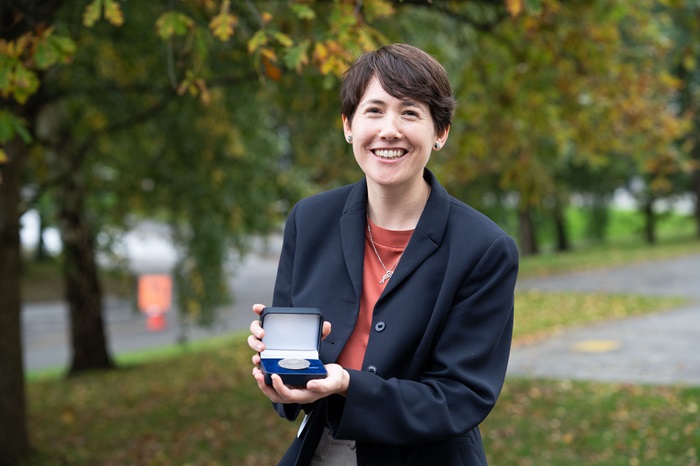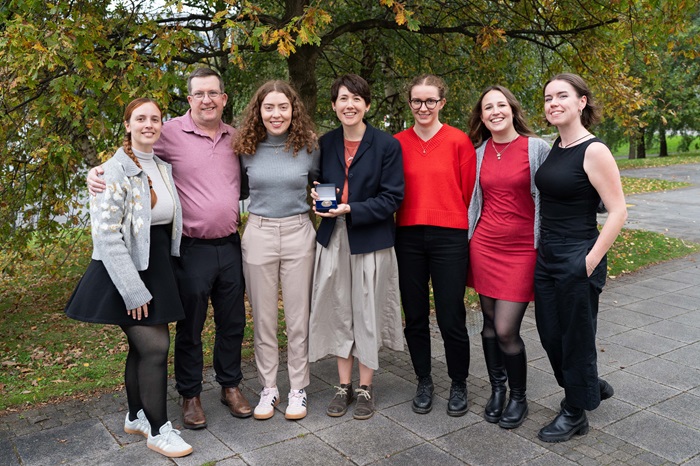2025 UCD Conway Festival gold medal for research on a new gene mutation in eye disease named after blind Irish poet.
Dr Tess McCann has won the 2025 UCD Conway Festival Gold Medal for published research describing the discovery of a mutation in a gene called emc1 that causes major vision problems in zebrafish.
Dr McCann is a postdoctoral researcher from the UCD School of Biomolecular & Biomedical Science who works with the team led by Professor Breandán Kennedy in UCD Conway Institute.
The Kennedy group use tiny, tropical fish as a tool to find novel genes that cause inherited blindness and help find better treatments for inherited retinal blindness.
 Dr Tess McCann, 2025 UCD Conway Festival gold medal winner. Credit: Richie Stokes
Dr Tess McCann, 2025 UCD Conway Festival gold medal winner. Credit: Richie Stokes
In this study, Dr McCann described how mutations were artificially created at random across the genome of the zebrafish. The offspring of these zebrafish were then screened for the characteristics of blindness.
One of the zebrafish families identified carries a mutation in the emc1 gene that was affectionately named as the "raifteirí" (raf) zebrafish after the 18th century blind Irish poet Antoine Ó Raifteirí. Zebrafish with this mutation had poorly developed eye cells, weaker responses to light, and changes in the normal structure of their retinas.
Describing the key findings of the study, Dr McCann said,
“The raf zebrafish didn’t react to visual tests and had major vision problems. The eye cells in these zebrafish were thinner and had unusual shapes. Genes needed to help the eye process light signals weren’t working as they should.”
The emc1 gene is crucial for the proper functioning of the endoplasmic reticulum, which is a part of the cell involved in protein production and transport.
“Our research shows the vital role of Emc1 in vision and lays the groundwork for exploring potential solutions to its dysfunction.”
Inherited retinal diseases are rare eye conditions that lead to progressive vision loss due to the degeneration of cells in the retina, the light-sensitive layer at the back of the eye. Over 300 genes have been identified in patients but it is often unclear how the mutations cause sight loss.
Currently, there is one approved therapy but this is only suitable for use in a small number of patients. There is no effective treatment available for many patients.
With the development of the first vertebrate animal model with total loss of emc1, Dr McCann believes that the Kennedy team now have an extremely useful tool for studying eye diseases and finding new treatments.
 Pictured (l-r): Camilla Fontana, Prof. Breandán Kennedy, Grace Ruddin, Dr Tess McCann, Ailbhe Conway, Emma Cadoria, Dr Niamh Duggan. Credit: Richie Stokes
Pictured (l-r): Camilla Fontana, Prof. Breandán Kennedy, Grace Ruddin, Dr Tess McCann, Ailbhe Conway, Emma Cadoria, Dr Niamh Duggan. Credit: Richie Stokes
The UCD Conway Festival Medal sponsored by Cruinn Diagnostics (www.cruinndiagnostics.ie) is awarded to an early career researcher based on a substantial body of research that has either been published or submitted for publication in the 12 months preceding the Festival.
Dr McCann was awarded the Gold Medal by Professor Kate Robson-Brown, Vice-President for Research, Innovation & Impact at the closing ceremony of the 2025 UCD Conway Festival of Research and Innovation, which took place on 01-02 October.
Professor Helen Roche, Director, UCD Conway Institute and Chair of the judging panel said, “I want to congratulate Tess on winning the Festival Gold Medal for her eye disease work that provides real hope to patients for future treatments in inherited blindness.
Commenting on her award, Dr Tess McCann said, 'I'm delighted to have won the gold medal at the Conway Festival while showcasing highlights from our published work. This achievement wouldn't have been possible without the immense support from both the Kennedy research team and the wider Conway community. I am incredibly grateful and look forward to continuing the exciting work stemming from this project.'
Photo gallery available on Flickr by clicking on the image above.
Tess competed against four other early career researchers who were shortlisted in the competition. They are Dr Maurice O Mara [Knaus group; runner-up], Dr Luke Jones [Bond group], Emmanuelle D. Aiyegbusi [Dooley group] and Angelique Cheryl [McGee group]
The annual UCD Conway Festival of Research and Innovation featured research from 150 early career researchers, panel discussion on the evolving research funding landscape as well as presentations from leading scientists including Professor Wendy Bickmore (University of Edinburgh), Dr Antoine Drieu (Paris-Cité University) and Professor Natalie Artzi (Harvard Medical School).
Journal reference:
McCann, Tess et al. “Emc1 is essential for vision and zebrafish photoreceptor outer segment morphogenesis.” FASEB journal : official publication of the Federation of American Societies for Experimental Biology vol. 38,19 (2024): e70086. doi:10.1096/fj.202401977R
Antoine Ó Raifteirí was an 18th Irish language poet who lost his vision following an illness in childhood. The first four lines of his poem, "Mise Raifteirí an File" appeared on the reverse of the Irish five pound note (Series C).
Mise Raifteirí, an file,
lán dóchais is grá
le súile gan solas,
ciúineas gan crá
I am Raifteirí, the poet,
full of hope and love
With eyes without light,
silence without torment.

Social Media Links